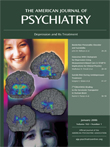Effect of a Triallelic Functional Polymorphism of the Serotonin-Transporter-Linked Promoter Region on Expression of Serotonin Transporter in the Human Brain
Abstract
OBJECTIVE: The authors examined effects of a triallelic functional polymorphism of the human serotonin-transporter-linked promoter region (5-HTTLPR) on in vivo expression of serotonin transporter in the brain in healthy volunteers and subjects with major depressive disorder. METHOD: Twenty-five medication-free subjects with DSM-IV major depressive disorder during a major depressive episode and 42 healthy volunteers were clinically evaluated and genotyped. Serotonin transporter binding potential (f1Bmax/Kd) was determined by using positron emission tomography with the radiotracer [11C]McN 5652 and metabolite-corrected arterial input functions. RESULTS: There was no difference in serotonin transporter binding potential by genotype in healthy volunteers or in subjects with major depressive disorder. Allelic frequencies did not differ between subjects with major depressive disorder and healthy volunteers. CONCLUSIONS: Associations of the 5-HTTLPR polymorphism to clinical phenotypes appear to be due to developmental effects of 5-HTTLPR on expression and not due to its direct effect on serotonin transporter binding in adulthood.



